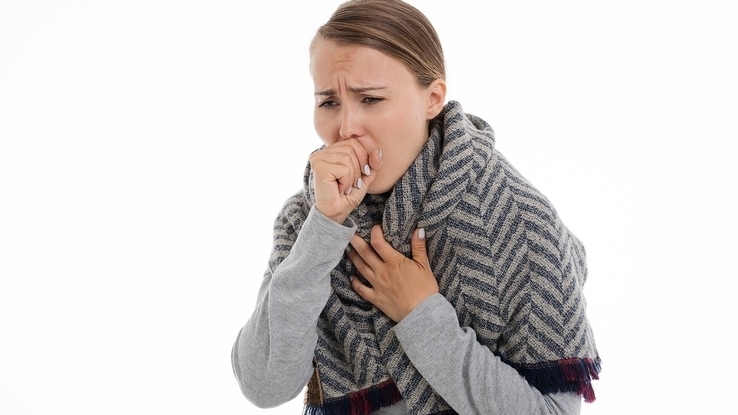
Coughing is your body’s way of clearing airways of mucus as well as dust and other irritants. By itself, a cough probably isn’t a sign of a more serious health problem and will likely go away within three weeks. While you may experience a wet or chesty cough — one that brings up phlegm or otherwise feels like it’s clearing your throat — you may also experience a dry cough. These may come with a tickling sensation and don’t come with mucus.
What you should take for a dry cough depends on what’s causing it. In all cases, however, if a cough — wet or dry — lasts for more than three weeks, it may be worth scheduling a visit to the doctor. While most coughs are caused by minor infections of the upper respiratory tract, in rare cases, they can be a sign of more serious problems.
What Causes a Dry Cough?
Coughing helps get rid of irritants and germs that have gathered in the throat. The throat and lungs are normally coated in a small amount of mucus to keep them moist and protect against germs and harmful substances. Under normal circumstances, coughing helps to redistribute that mucus to where it needs to be. Nerves in your throat, nose and lungs also let your body know when it should cough to expel irritants.
The common cold, allergies to pollen or other airborne irritants, smoking and breathing in caustic fumes are common causes of a dry cough, although there are rarer culprits. A post-nasal drip — when mucus drips down the throat from the back of the nose — can cause a wet or dry cough, while bronchitis and pneumonia may start out as a dry cough before becoming a wet one. Pertussis, which is more commonly known as whooping cough, can cause severe dry coughing, although it’s most severe (and dangerous) in infants. Children are also more susceptible to croup, which causes a loud, barking cough. ACE inhibitors, a kind of prescribed medicine used to treat heart disease and high blood pressure, can also make people cough.
There are also many long-lasting conditions that can cause a dry cough, including asthma, acid-reflux and chronic obstructive pulmonary disease (COPD). The latter is caused when the lungs become inflamed after frequent exposure to irritants, especially cigarette smoke. Heart failure, lung collapse, lung cancer and pulmonary embolism — when a blood clot travels from elsewhere in the body to the lungs — are life-threatening but much rarer causes of a dry cough. Strangely enough, stress can also cause coughing.
What Relieves a Minor Dry Cough?
While a dry cough is likely to go away with time, there are a few things you can do to help it along. By resting, you indirectly help your immune system, which in turn will help you get over the cough faster. Similarly, drinking lots of fluids If your cough is the result of exposure to chemicals or cigarette smoke, staying away from them can give your body a chance to recover. If you have hay fever, it can be difficult to get away from the pollen causing your dry cough. However, showering and changing clothes after going outside can help. Steam, such as from a humidifier or hot shower, can indirectly help with a cough by strengthening the mucus that normally catches germs and irritants.
You can also treat the symptoms of a dry cough if it’s bothering you. Cough drops (also known as lozenges) can numb the back of your throat depending on their ingredients, which may ease throat irritation. Tea or lemon water mixed with honey can help reduce coughing, although even honey alone is just as effective at reducing coughing as an over-the-counter dose of dextromethorphan, a common cough suppressant. Be aware, however, that infants under the age of one should not be given honey since it can cause botulism.
Medications for Dry Coughs
While you can buy many kinds of medication that reduce coughing, you should take care in which ones you use and for how long, as they can end up keeping a cough around longer than if you hadn’t taken anything at all. Expectorants, such as guaifenesin, are marketed as helping to loosen and therefore expel mucus, but there’s little evidence that they’re actually effective. Similarly, while cough drops (also known as lozenges) may help with the discomfort of a cough depending on their ingredients, they haven’t been proven to reduce how often a person coughs.
Nonprescription cough suppressants, such as dextromethorphan, as well as prescription suppressants, such as codeine, can reduce coughing, but that’s not always a good thing. Because coughing expels germs and redistributes mucus, it may take longer to recover if you completely prevent coughing.
An inhaler can help with the symptoms of a dry cough caused by asthma.
When to Go to the Doctor
Dry coughs are even less likely to be dangerous than wet ones, and most clear up on their own without need for a doctor. However, if you have a dry cough as well as fever, drowsiness, headache, unusually colored mucus or trouble breathing, you should consider calling your doctor. Unusually noisy coughs that make a wheezing, barking or whooping sound should also be of particular concern. Weight loss, high fever, bloody mucus, fatigue or chest pain accompanied by a dry cough are a sign you should call your doctor right away.





